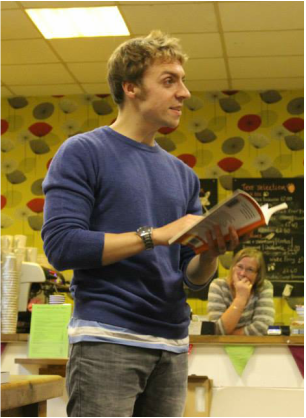
However, it is not enough to simply show up and read. You should put a lot of consideration into your performance to ensure you get the most out of the event.
Here are my top five tips for speaking at a spoken word event.
1. Pick Wisely - you need to pick a piece of writing that is suitable for the tone of the evening. Is there a theme for the event? If so, then stick to it. I attended the Brewsmiths spoken word evening last week and the theme was stories set in Birmingham. I therefore read my Birmingham-based poem, Crispin the Crooked. If I had showed up and read a chapter from my fantasy novel The Sheriff then it would ignore the theme altogether and appear quite dismissive. If your novel is appropriate to the theme and you decide to read an extract then read an early chapter which sets up the story, otherwise the audience will find it hard to follow. Speaking of which, it is also important to be mindful of the audience. If it is a daytime event and young people are present then pick something appropriate. If the event is late at night and everyone is older then feel free to go darker and pick a piece with bad language.
2. Hi, My Name Is - remember to introduce yourself before you speak. It is a good way for the audience to get to know you and see that writers are people too, not just a name on a front cover. Building a rapport with the audience by telling them a little about yourself (name, writing history, current projects) may increase your chances of selling a book from the inevitable Table Of Merchandise which is provided at most spoken word events.
3. Short and Sweet - do not outstay your welcome. If you hog the spotlight for more than ten minutes then it will deprive other writers of the chance to share their work. It is also likely that the audience will grow tired of you. If you have been allocated a set time slot then you should respect the window by filling the slot but not running over.
4. Practise - it is essential that you practise before you read to a group of strangers. It will give you confidence and allow you to familiarise yourself with your text so you do not stumble over your own words. A few test-runs will also help you get the timing spot on.
5. Speak Up, Look Up - volume and clarity are essential when reading. Not every venue will have a microphone so stand up straight so your voice projects further and speak up. There is nothing more sleep-inducing than someone who mumbles at a spoken word event. Eye contact is also important. This can be difficult when you have to look down to consult the page in front of you but look up whenever you can. It allows you to connect with the audience but also keeps them on their toes. They are less likely to look down at their phones if you keep looking at them to check they are still listening!
